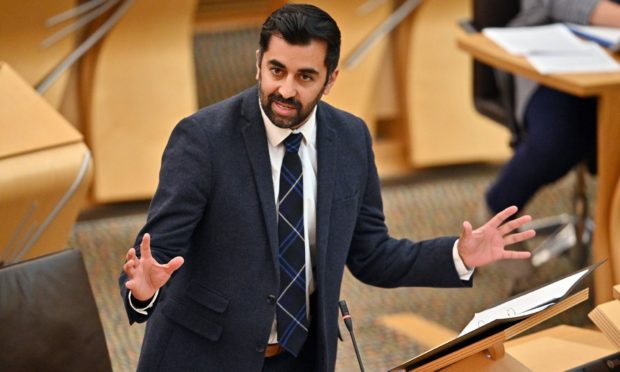Health Secretary Humza Yousaf has said he is “confident” the booster vaccine roll-out can be accelerated to reach the government’s target by the end of the year.
Yesterday, Scotland distributed a record number of 54,234 booster vaccines.
It has been identified as one of the most significant ways to tackle the severity of the Omicron variant.
The health secretary was interviewed on BBC’s Good Morning Scotland a week ago when Omicron cases accounted for around 6% of all cases.
Today, he appeared again when around 36.5% of cases in Scotland are of the new variant.
“The variant is the most transmissible, fastest we’ve seen throughout the whole pandemic,” Mr Yousaf said.
Accelerating the booster roll-out
Mr Yousaf made an appeal to the public to book their booster appointment if they have not already done so, saying it will protect individuals, families and the wider community.
Although a record number of vaccines were distributed on Wednesday, even more will need to be done to reach the government’s target.
“The 25th and 26th of this month, we won’t have any vaccinations, so we’ve got to front load that as much as we can,” he said.
“We’ve done some revised modelling to get to the 80% uptake target of those who are eligible for a booster by the end of the year. We need to increase the run rate around about 61,000, we’re not far off that.
“We are working particularly with the like of Greater Glasgow and Clyde, Lothian, Lanarkshire, those big population areas to see how we can increase the capacity.
“I’m confident that we’re going to accelerate that run rate.
“Doing everything we possibly can, throwing everything, the kitchen sink plus more at this, we’re really determined.
“We’re leading other UK nations by quite a distance, so we’re making really good progress in Scotland. I will ensure we’ll go even faster than we’re going.”
Difficult decisions
Prior to the emergence of the Omicron variant, the government knew there would be “extreme challenges” for the NHS throughout winter.
Some funding is being put towards safely discharging patients from hospitals and into community settings to relieve pressure on the NHS.
However, the health secretary said further trouble comes from the demand “still coming through the front door.”
He ensured that there are “safe testing and clinical pathways” in place to transfer people to care homes and nobody will be placed in homes with Covid outbreaks.
When asked about hospitals having to cancel elective surgeries due to Covid demand, he said there are “really tough decisions” being made.
He added: “Health boards will make those judgements, of course, we keep that situation under very regular, daily review.”
Guidance for businesses
Mr Yousaf also confirmed that guidance for businesses will be published today and he has “every confidence” in them being able to do their part in reducing the spread of the virus.
Many have been waiting for further information about how they should operate since the first minister’s address on Tuesday.
He said: “What I will say to businesses who have done an incredible job throughout the entire pandemic in terms of mitigating the risk around Covid transmission, they know what they need to do in terms of avoiding crowding in their premises.
“So, of course the guidance will undoubtedly help, it will be published today, but I would say you’ve worked so hard, you know what you need to do.
“I’ve got every confidence in business being able to take those measures that will help to reduce Covid transmission.”
Time for a circuit breaker lockdown?
Earlier in the radio programme, Deepti Gurdasani, a senior lecturer at Queen Mary University in London, suggested it was time for a circuit breaker lockdown to crack down on rising Omicron cases.
In response, Mr Yousaf said it was important for the government to take a balanced approach.
He said: “We understand that 20 months into this people’s mental health is suffering, the economy is suffering, people’s wellbeing is suffering, educational disruption.
“Of course, as a government there are other measures we could take that could limit some social mixing but they would come at a harm and a cost.
“I understand what public health experts are saying from their level of expertise, but the government’s job is to balance those various harms.”
The health secretary concluded by saying they will always lead by clinical advice and any changes will be shared with the public “wide and far”.
